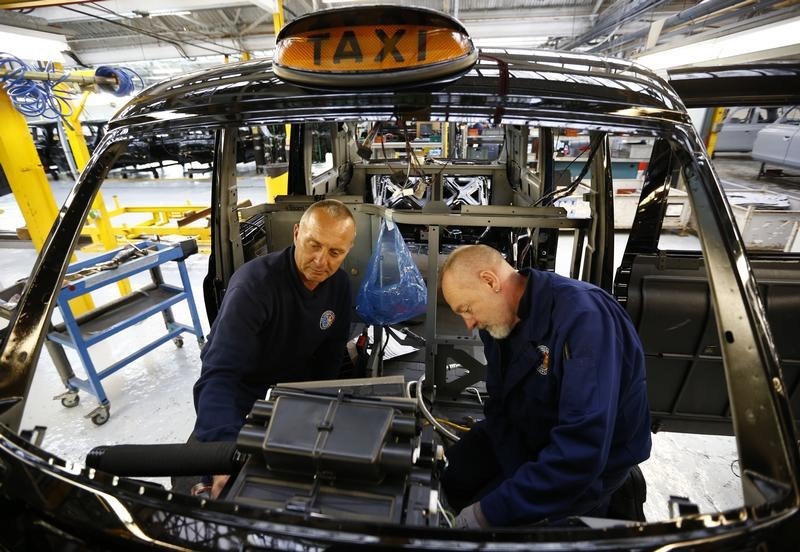By William Schomberg and Andy Bruce
LONDON (Reuters) - A slump in manufacturing in July and a sharp widening of the trade deficit show Britain's economic recovery is losing some steam and may prompt the Bank of England to stress that it is in no rush to raise interest rates from crisis-era lows.
Factory output suffered its first year-on-year fall in nearly two years, hit by an earlier than usual summer shutdown of vehicle production lines but also by weaker demand from other major economies, reflecting concerns about global growth.
Exports of goods dropped by more than 9 percent, the biggest fall since July 2006, the Office for National Statistics said.
Capital Economics said the manufacturing sector had made a "terrible start" to the third quarter, although that would be cushioned by the effects of near-zero inflation, low unemployment and strong growth in the huge services sectors.
Howard Archer, economist at IHS Global Insight, said he might have to lower his estimate for third-quarter growth to 0.5 percent, slowing from 0.7 percent in the previous three months.
The Bank of England's interest rate-setters are due to vote on Wednesday on whether to raise interest rates from their record low 0.5 percent for the first time in six years.
The decision, due to be announced at 1100 GMT on Thursday, is expected to be a repeat of August's 8-1 vote in favour of no change, according to economists.
David Tinsley, at UBS, said the slowdown in the world economy appeared to be taking its toll on Britain, with output of capital goods -- which are typically bought by foreign manufacturers -- down by 0.5 percent over the last three months.
"This could prove a transitory phase but the possibility that it could become more protracted could tempt the (BoE's Monetary Policy) Committee to lean in a heavily dovish direction," he said in a note to clients.
Sterling fell against the dollar and the euro after Wednesday's data, which followed other signs of weaker growth in Britain's economy from recent private sector surveys.
BoE Governor Mark Carney has said a decision on whether to raise interest rates will "come into sharper relief" around the end of the year. Economists expect a first hike in early 2016 but many say a slowdown in China's economy or a delay to plans for a first rate hike in the United States could push that back.
The ONS said output in manufacturing contracted by 0.8 percent from June, a sharp contrast with a forecast for a 0.2 percent increase in a Reuters poll of economists.
The weak factory numbers dragged down overall industrial output, which showed a monthly fall of 0.4 percent in July.
British manufacturers are struggling under a combination of weak demand in Europe and other economies around the world and a stronger pound. A group representing the sector this week halved its forecast for growth in 2015.
Britain's deficit in its trade in goods ballooned to 11.082 billion pounds in July, the biggest shortfall in a year.
Including Britain' surplus in services, the overall deficit widened to 3.371 billion pounds, four times its level in June, but in line with its level in the early months of 2015.
The ONS noted weaker exports of chemicals in the month.
Exports to the United States suffered their sharpest fall on the month in value terms since records began in 1998.

Britain's trade deficit narrowed sharply between April and June, boosting economic growth in the period. But economists have previously said the improvement is unlikely to last.